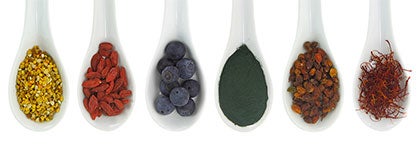The Lowdown on Antioxidant Supplements

Ask the Dietitian: Should I be taking antioxidant supplements to combat cell damage from running high mileage?
Get your antioxidants from real foods, not supplements. Photo courtesy of BigStockPhoto
Editor’s Note: This is an installment in our online Ask the Dietitian column with Maria Dalzot, MS, RD, CDN and an avid trail runner. You can visit her blog at www.mariadalzotrd.com and submit your nutrition questions to nutrition@trailrunnermag.com.
Should I be taking antioxidant supplements to combat cell damage from running high mileage?
Everybody experiences damage to their cells by free radicals, which are unstable molecules produced in the body as a result of normal metabolism. However, runners are subject to greater oxidative stress, or cellular damage, which occurs when free radicals outnumber the protection from antioxidants. Though the body generates many kinds of antioxidants to protect itself from free radical damage, heavy training can overwhelm the body’s ability to defend itself using its own antioxidants.
The act of running a single marathon or hard workout produces far more free radicals than simply sitting in your office chair. However, several recent studies indicate that regular physical exercise enhances your body’s antioxidant defense system—suggesting that elite runners or those who run daily may be less susceptible to cell damage than “weekend warriors.”
Some signs and symptoms of oxidative stress include headache, fatigue, muscle pain and inability to recover efficiently from hard workouts. It is important to address symptoms of oxidative stress at an early stage because, over time, cell damage can manifest itself through chronic diseases such as heart disease and cancer.
This is where diet comes in. A whole-foods, plant-based diet of vegetables, fruit and whole grains—all naturally high in antioxidants—can help your body battle oxidative stress.
Endurance athletes who consume adequate calories usually meet or exceed the recommended intake for vitamins and minerals. For these athletes, additional antioxidant supplementation is not recommended. It is only when you regularly restrict calories or eat a limited variety of foods, as in diets where the focus is on eating a single food or nutrient, that you may be at risk for suboptimal antioxidant intake. Supplementation may then be advantageous and should be considered under the guidance of a registered dietitian or other healthcare professional.
Some runners who eat a well-balanced, variable diet may still choose to take antioxidant supplements as a form of dietary insurance. However, there is inconclusive research that indicates taking supplements will improve training or enhance recovery. In fact, there is more evidence that antioxidant supplementation is detrimental to health and training. A 2013 study from the European Journal of Sport Science looked at the effects of antioxidants on training and performance in female runners. Following vitamin C supplementation, the athletes’ running speed decreased and some markers of oxidative stress were elevated, suggesting that antioxidant supplementation should be used with caution. This also reinforces the importance of seeking antioxidants from a variety of sources and not just targeting one specific vitamin or mineral for optimum health.
A 2011 review from Sports Medicine, suggests that antioxidants taken in excessive amounts can, in fact, delay muscle recovery and interfere with the body’s natural defense against free radicals.
Because there is no defined magic dose of antioxidants, those who choose to take supplements should do so in low amounts. Until there are more convincing results to take antioxidant supplements, runners should focus on consuming an antioxidant-rich plant-based diet of fruits, vegetables and whole grains to protect against oxidative damage.